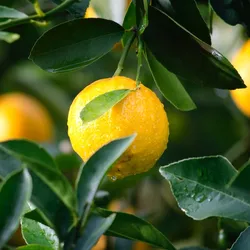
Level 1:
Lemon farms grow tasty lemons. They use good farming. Lemons taste tangy and fresh. People like them. Lemon farms help Earth. They are friends with nature. Young trees start as small plants. Bugs can bother them. Sometimes weather changes. Sickness can come to plants. Friendly farming is nice. Bad things don’t hurt plants. Bugs that help visit flowers. Flowers become lemons. Lemons can taste different. Lots of kinds make a happy group. Nature likes many types. People need water for trees. Rain doesn’t come always. Sun makes plants hot. Farmers pick lemons at the right time. They pack them in boxes. Boxes go to shops. People buy lemons. Lemons make food and drinks better. Farms give jobs. People work on farms. They make money. Lemon farms keep growing. This is good for tomorrow. We need lemons and farms. It’s a circle of nature and people.
Level 2:
Lemon farms are special places where they grow lemons, those zesty fruits. They use smart ways to grow them that don’t hurt our Earth. Lemons are tangy and delicious. People enjoy them in food and drinks. These farms are good for nature, too. They take care of the young lemon trees. Some bugs can be a problem, and the weather sometimes changes a lot. But farmers have clever methods. They don’t use bad stuff that can harm nature. There are helpful bugs, like bees, that visit the flowers. Flowers turn into lemons. There are many types of lemons, each with its own taste. Lemon farms need water, but sometimes it doesn’t rain enough. The sun also helps the lemons grow big and juicy. When the lemons are just right, farmers pick them and put them in boxes. Then they go to stores for people to buy. Lemon farms give jobs to people and help the economy. They’re good for the environment too. They want to keep getting better, so we’ll have lemons for a long time. It’s like a circle of nature and people working together.
Full Story:
Title: Lemon Farms: Sustainable Agriculture
Lemon farming isn’t just about zesty flavors; it’s a journey into sustainable agriculture that’s changing the way we grow and enjoy this tangy fruit. Let’s dive into the down-to-earth world of lemon farms, where practicality meets environmental consciousness.
Getting to the Roots: The Basics of Lemon Farms
Lemon farms, those sunny patches of green, are more than meets the eye. They’re the engines of nature, working tirelessly to churn out those bright, citrusy delights we add to our drinks and dishes. But what’s the secret behind their vibrancy and tanginess? It’s all about the basics: healthy soil, ample sunlight, and just the right amount of water.
From Seed to Sapling: The Lemon’s Journey Begins
Imagine this: a tiny lemon seed nestled snugly in the soil. It’s the beginning of an adventure where each step counts. Water and warmth coax the seed to sprout, and soon, a sapling emerges. This sapling will grow into a tree, bearing the weight of countless lemons in its lifetime. But it’s not all smooth sailing; pests, weather fluctuations, and disease can all throw a wrench into the works.
The Eco-Friendly Side of Lemon Farming
Now, here’s where things get interesting. Sustainable agriculture is all the rage these days, and lemon farms are joining the party. Farmers are embracing eco-friendly practices that benefit both the environment and our taste buds. They’re ditching synthetic pesticides for natural alternatives, which keeps harmful chemicals off our plates and reduces harm to beneficial insects.
Nature’s Helpers: The Unsung Heroes of Lemon Farms
Ever thought about the busy bees and fluttering butterflies that make lemon farming possible? These critters are unsung heroes, playing a pivotal role in pollinating lemon blossoms. Without their assistance, those blossoms wouldn’t turn into the juicy lemons we love. It’s a delicate partnership between nature and farming, and it reminds us that even the tiniest creatures have a big impact.
Rooting for Diversity: Lemon Varieties and Biodiversity
Did you know there isn’t just one type of lemon? Lemon farms are bursting with diversity, each variety offering a unique flavor profile and culinary potential. From the common Eureka lemon to the zingy Lisbon lemon, these varieties create a symphony of tastes that cater to every palate. But diversity isn’t limited to lemons alone; it extends to the entire ecosystem of the farm. Preserving biodiversity means healthier soil, happier plants, and a balanced environment.
Challenges on the Horizon: Weather and Water Woes
Lemon farming isn’t all sunshine and rainbows. Changing weather patterns and water scarcity are real challenges that farmers face. Erratic rains and prolonged droughts can wreak havoc on lemon crops, affecting both quantity and quality. It’s a wake-up call to adapt and find innovative ways to ensure a steady supply of these tangy treats without straining local water resources.
Lemons: A Slice of Economic Impact
Lemon farms don’t just contribute to our culinary experiences; they also have a significant economic impact. They create job opportunities in farming, harvesting, and distribution. Local economies thrive as lemon farms become bustling hubs of activity. But the economic aspect isn’t the only driving force; it’s the passion of the farmers and their commitment to cultivating a sustainable future.
Savoring the Fruits of Labor: From Farm to Table
Ever wondered about the journey your lemon takes before gracing your kitchen? It’s a trek that involves careful plucking, sorting, and packaging. Farmers ensure that the lemons are at their peak when they reach your table. And when you slice that lemon and the juice trickles down, it’s a moment to savor—a connection to the land and the hands that nurtured it.
What Does the Future Hold for Lemon Farms?
As we look ahead, questions arise: How can lemon farms adapt to a changing climate? How do we strike a balance between meeting demand and preserving resources? Can technology play a role in making lemon farming even more sustainable? These are the questions that farmers, researchers, and consumers are pondering as they work together to shape the future of lemon farming.
Conclusion: A Tangy Tale of Sustainability
Lemon farms are more than just orchards; they’re stories of sustainability in action. From the earthy beginnings of a lemon seed to the zest-filled kitchens where they’re used, this journey embodies the essence of practicality, care, and environmental consciousness. As we relish the zing of a lemon, let’s remember the intricate web of efforts that brings it to our lips—one tangy slice at a time.
Questions:
Question: What do lemon farms grow?
Answer: Lemon farms grow lemons, those tangy and zesty fruits that people love to eat.
Question: Why are sustainable practices important in lemon farming?
Answer: Sustainable practices are important in lemon farming because they help protect the environment and make sure we can keep growing lemons for a long time without harming the Earth.
Question: What role do beneficial insects play on lemon farms?
Answer: Beneficial insects, like bees, help lemon farms by pollinating the flowers. This helps the flowers turn into lemons, which is important for a good harvest.
Question: Do different types of lemons taste the same?
Answer: No, different types of lemons have unique flavors. Each variety has its own taste, from zesty to mild, giving us a range of flavors to enjoy.
Question: In what ways do lemon farms contribute to the economy and communities?
Answer: Lemon farms provide jobs to people, from growing to harvesting and distribution. They also contribute to local economies by selling their lemons, which people buy and use in their food and drinks.
Fill in the Blanks:
Erratic, sapling, relish, disease, distribution, biodiversity, Tangy, zesty, plucking, practicality, symphony, packaging, droughts, peak, palate, blossoms, tangy, cater, pesticides, fluctuations, Varieties, pests, Sapling, Biodiversity, cultivating, trek, sorting, harvesting, varieties, essence, pollinating
Title: Lemon Farms: Sustainable Agriculture
Lemon farming isn’t just about ________ flavors; it’s a journey into sustainable agriculture that’s changing the way we grow and enjoy this ________ fruit.
Let’s dive into the down-to-earth world of lemon farms, where ________ meets environmental consciousness.
From Seed to ________: The Lemon’s Journey Begins
Imagine this: a tiny lemon seed nestled snugly in the soil.
Water and warmth coax the seed to sprout, and soon, a ________ emerges.
But it’s not all smooth sailing; ________, weather ________, and ________ can all throw a wrench into the works.
They’re ditching synthetic ________ for natural alternatives, which keeps harmful chemicals off our plates and reduces harm to beneficial insects.
These critters are unsung heroes, playing a pivotal role in ________ lemon ________.
Rooting for Diversity: Lemon ________ and ________
Did you know there isn’t just one type of lemon?
From the common Eureka lemon to the zingy Lisbon lemon, these ________ create a ________ of tastes that ________ to every ________.
Preserving ________ means healthier soil, happier plants, and a balanced environment.
________ rains and prolonged ________ can wreak havoc on lemon crops, affecting both quantity and quality.
They create job opportunities in farming, ________, and ________.
But the economic aspect isn’t the only driving force; it’s the passion of the farmers and their commitment to ________ a sustainable future.
It’s a ________ that involves careful ________, ________, and ________.
Farmers ensure that the lemons are at their ________ when they reach your table.
Conclusion: A ________ Tale of Sustainability
Lemon farms are more than just orchards; they’re stories of sustainability in action.
From the earthy beginnings of a lemon seed to the zest-filled kitchens where they’re used, this journey embodies the ________ of practicality, care, and environmental consciousness.
As we ________ the zing of a lemon, let’s remember the intricate web of efforts that brings it to our lips—one tangy slice at a time.
Vocabulary:
Lemon Farms: Agricultural areas where lemon trees are cultivated for their fruit.
Sustainable Agriculture: Farming practices that are designed to be environmentally friendly, economically viable, and socially responsible over the long term.
Zesty: Having a strong, fresh, and invigorating flavor or aroma.
Tangy: Having a sharp, strong, and slightly sour taste.
Down-to-earth: Practical and realistic; not overly fancy or complicated.
Practicality: The quality of being useful, effective, and suitable for real-life situations.
Environmental Consciousness: Awareness and concern for the well-being of the natural world and the impact of human activities on it.
Sapling: A young tree, especially one with a slender trunk.
Pests: Insects or animals that damage crops, plants, or other resources.
Fluctuations: Changes or variations, especially when they are not consistent or predictable.
Disease: An abnormal condition that affects the body or a plant and often impairs normal functioning.
Eco-Friendly: Not harmful to the environment; designed to have minimal negative impact on nature.
Pesticides: Chemical substances used to control or eliminate pests like insects, weeds, or diseases.
Natural Alternatives: Substitutes derived from nature that are used instead of synthetic or chemical products.
Beneficial Insects: Insects that contribute positively to an ecosystem by pollinating plants or preying on pests.
Pollinating: The transfer of pollen from the male to the female parts of a flower, leading to fertilization and the production of seeds.
Blossoms: The flowers of a plant, especially those on fruit trees.
Varieties: Different types or kinds of something, often within the same category.
Biodiversity: The variety of life in a particular ecosystem, including the variety of species, genes, and ecosystems themselves.
Symphony: A harmonious combination or arrangement of different elements.
Cater: To provide what is needed or desired.
Palate: A person’s sense of taste.
Erratic: Inconsistent, irregular, or unpredictable.
Droughts: Extended periods of abnormally low rainfall, leading to water shortages.
Harvesting: Collecting crops or plants when they are ready to be used or sold.
Distribution: The process of delivering or spreading something, such as goods or resources, to various places.
Local Economies: The economic activities and conditions of a specific region or area.
Cultivating: Growing and tending to crops or plants.
Peak: The highest point or best condition of something.
Trek: A long and arduous journey.
Plucking: Removing by picking or pulling.
Sorting: Organizing or arranging things into different categories or groups.
Packaging: Putting products into containers or materials for transport or sale.
Relish: To enjoy or appreciate something.
Web of Efforts: The interconnected and collaborative actions taken by different people or groups.
Environmental Web: The **intricate **connections and interdependencies within an ecosystem.
Essence: The fundamental nature or most important qualities of something.
Intricate: Complex, with many details or parts.




